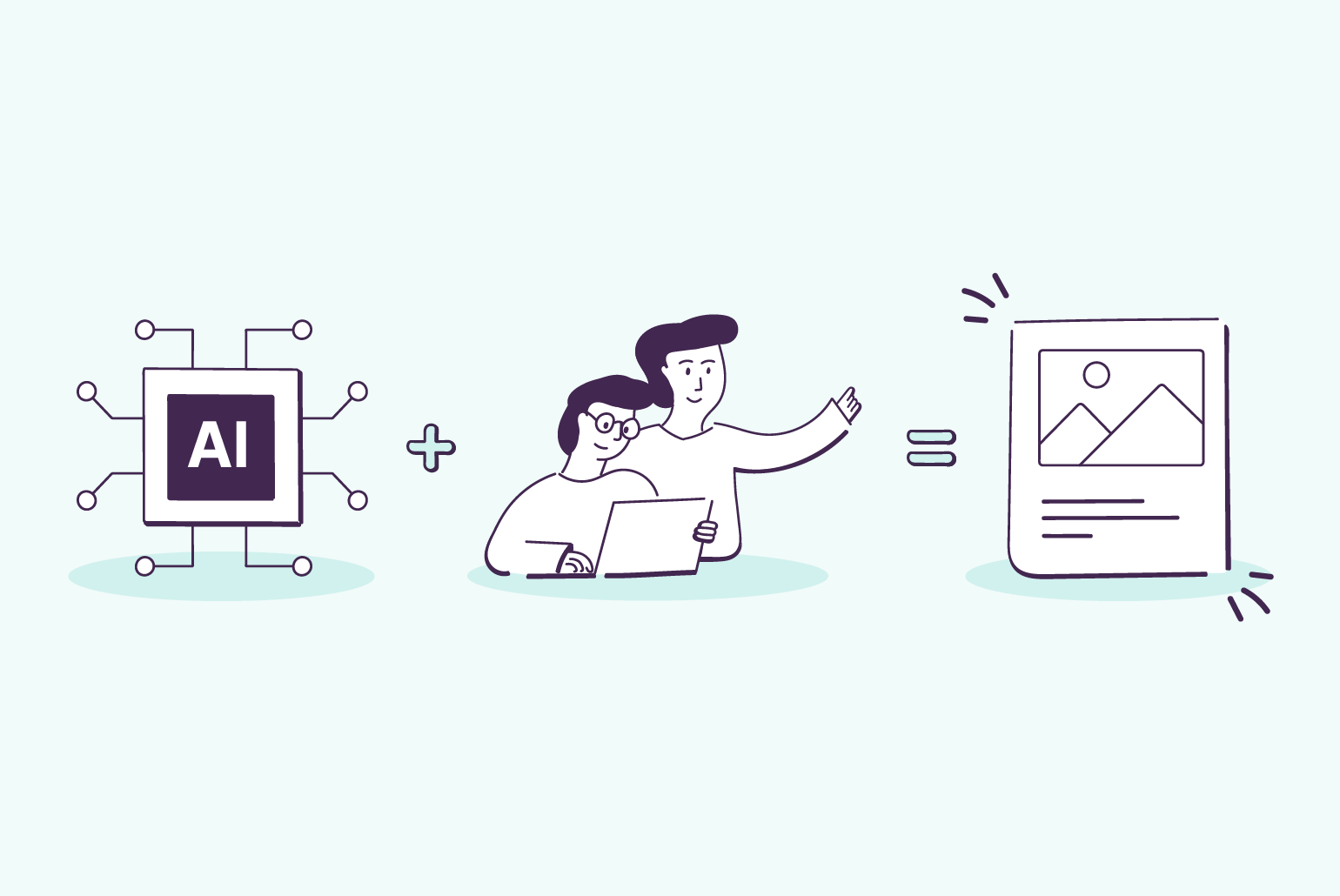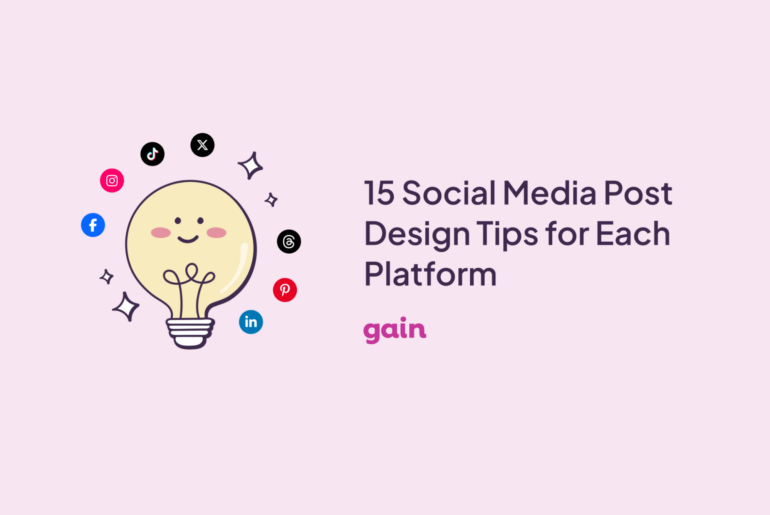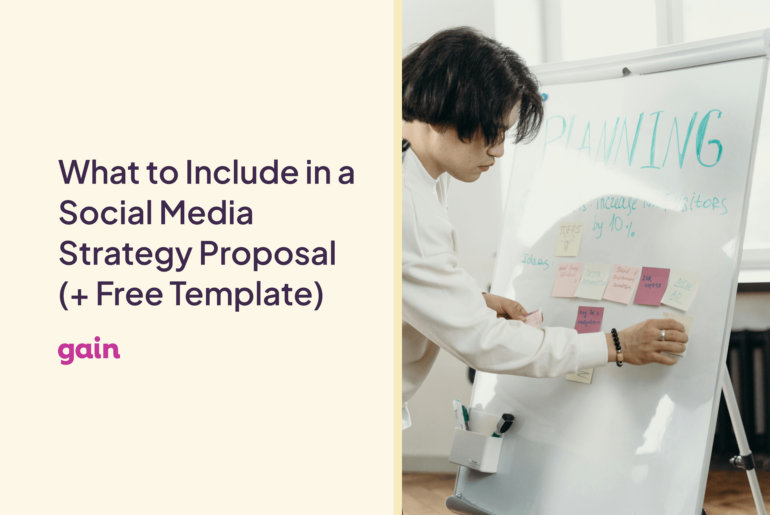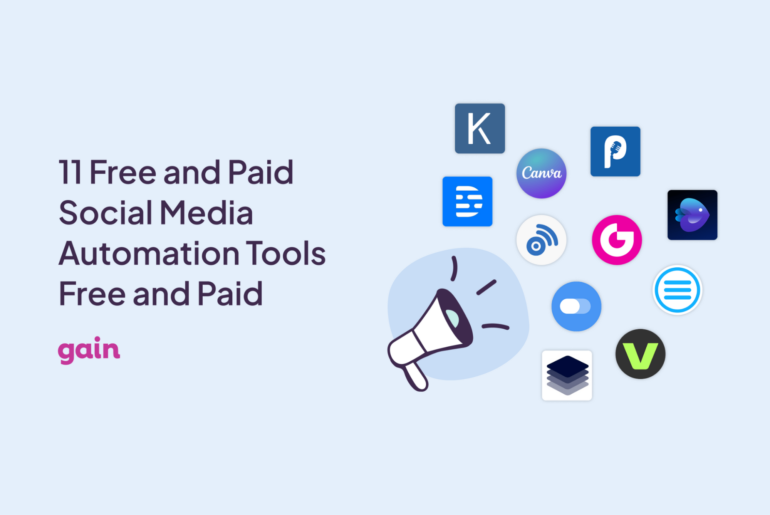In the past, creating and executing complicated marketing plans required large budgets and teams. Today, we have a range of AI tools that can handle content creation and marketing tasks for a fraction of the cost.
AI is pretty amazing. It can do things like research, generating initial drafts, and even recycling content. Moreover, AI excels in identifying insights from customer interactions and reviews to refine your messaging. However, achieving a truly resonant message necessitates human expertise.
When you combine AI-generated content with the human touch, you get what we call hybrid content. And, if leveraged right, hybrid content can be your competitive advantage.
So, what exactly is hybrid content, and why should you care about it? What are the advantages of using it, and how can you create it effectively?
We’re here to answer these questions for you.
Definition of Hybrid Content
Hybrid content combines AI-generated elements with human creativity and subject matter expertise to create and refine marketing materials.
AI contributes by analyzing data, generating insights, or automating certain tasks, while subject matter experts (SMEs) provide their knowledge, expertise, and judgment to ensure the content is accurate, relevant, and contextually appropriate.
Examples of Hybrid Content
Content generation:
- AI generates initial content, like reports and blog posts.
- Subject matter experts refine it with context and insights.
Social media content creation:
- AI drafts social media content using user data and trends.
- SMEs refine it to match the brand’s goals and engage the audience effectively.
Content A/B testing:
- AI conducts A/B tests on different content variations.
- Marketing teams analyze results and refine content strategies for better engagement and conversion.
Increasing Role of AI in Marketing
AI has been around since the 1950s, and even before ChatGPT took the world by storm, there were plenty of AI tools that marketers were already using.
Consider, for instance, Grammarly. Grammarly relies on AI technology to provide grammar suggestions, detect plagiarism, and conduct style checks, thus enhancing the quality of written content.
Similarly, SEMRush, a well-known SEO tool, harnesses the capabilities of AI for functions such as keyword research, competitive analysis, and content optimization.
AI’s role in content creation and marketing is growing due to its ability to generate high-quality content at scale. It can analyze user preferences and trends to create tailored content that resonates with the target audience, saving marketers time and effort.
Here are 4 ways marketers use AI, as per HubSpot’s data:
Source: HubSpot
Benefits of Hybrid Content in Marketing and Social Media
Let’s be real here—marketers have a lot on their plate. They have to keep up with the shifting social media trends while feeling the pressure to make the most of their marketing budgets.
Hybrid content, therefore, becomes an attractive option, packed with benefits, such as:
- Buying back time: AI can generate content quickly, which is valuable in fast-paced industries like news reporting or social media marketing. Human editors or writers can then review and fine-tune the content, saving themselves time. HubSpot study found that AI tools give marketers 12.5 hours back per week.
- Efficient scalability: AI rapidly generates content at scale, ideal for handling high volumes of repetitive content. For example, in e-commerce, AI creates descriptions for thousands of items while humans add a personal touch.
- Multilingual and global reach: AI can assist in the generation of content in multiple languages, enabling businesses to reach global audiences efficiently. Human touch is essential for ensuring cultural sensitivity, idiomatic expressions, and nuanced language adaptations that resonate with diverse audiences across the world.
Why Should Brands Create Hybrid Content?
Hybrid content is a form of automation. And, marketing automation comes with lots of perks for businesses.
Statista found that 43% of marketers believe that using marketing automation makes customers happier, and 38% think it helps staff manage their time more effectively.
Source: Statista
Another study by eMarketer discovered that the use of generative AI leads to increased performance, creative variety, cost efficiencies, and faster creative cycles.
Source: eMarketer
Use Cases of Hybrid Content
Reportedly, many world-famous brands are using AI in their marketing efforts. But what are the real-life scenarios where you can use hybrid content? Let’s take a look at some of them:
Research
Content agency owner, Rebekah Edwards, found that AI helps her streamline the research process for health articles she writes:
“As a freelance health writer, I could look for scientific research and write an article in ~4-6 hours. That content still needed editing by another person and uploaded to a website.
With ChatGPT, I’ve been able to write, edit, upload, and internally link TO my new page in between 1.75-2.5 hours (max).”
Outlines and Idea Generation
Irina Maltseva, growth advisor at Nextiva, believes that AI can help marketers in many ways, such as creating outlines, doing research, and generating content ideas. However, she admits that:
“At the same time, AI tools can only create something that already exists on the Internet. They don’t create anything new and don’t have a powerful voice.”
Ad Copy Creation
Creating hundreds of personalized ads can be time-consuming, but Meta is already working on its generative AI technology, which will offer brands innovative advertising tools. These tools are set to launch this year, enabling companies to automate the creation of diverse ad variations with varying text and images tailored to different audience segments.
Social Media Captions
Generative AI can assist in crafting engaging social media captions by generating creative and attention-grabbing content, helping brands enhance their online presence at scale.
Likewise, it can streamline the caption-writing process by suggesting relevant hashtags and optimizing content for specific platforms, saving users time and effort.
Check out our guide on how to use ChatGPT for social media.
How to Create Hybrid Content in 5 Easy Steps
- Choosing a topic: Start by selecting a subject for your content that requires a blend of AI-generated information and expertise in the field.
- Generating AI content: Use AI tools like ChatGPT-3.5 or our software, Gain, to create an initial draft of your content or any other marketing material you’re working on.
Gain’s AI Writer is a handy tool that offers numerous benefits for content creators looking to speed up content creation and ideation. With this tool, you can overcome writer’s block, enhance creativity, and streamline your writing process.
What’s even more convenient is that you don’t need to leave the Gain platform to access AI assistance—it’s seamlessly integrated within our tool. This means you can use AI to craft content and easily share it with your clients for their approval, all within a single platform.
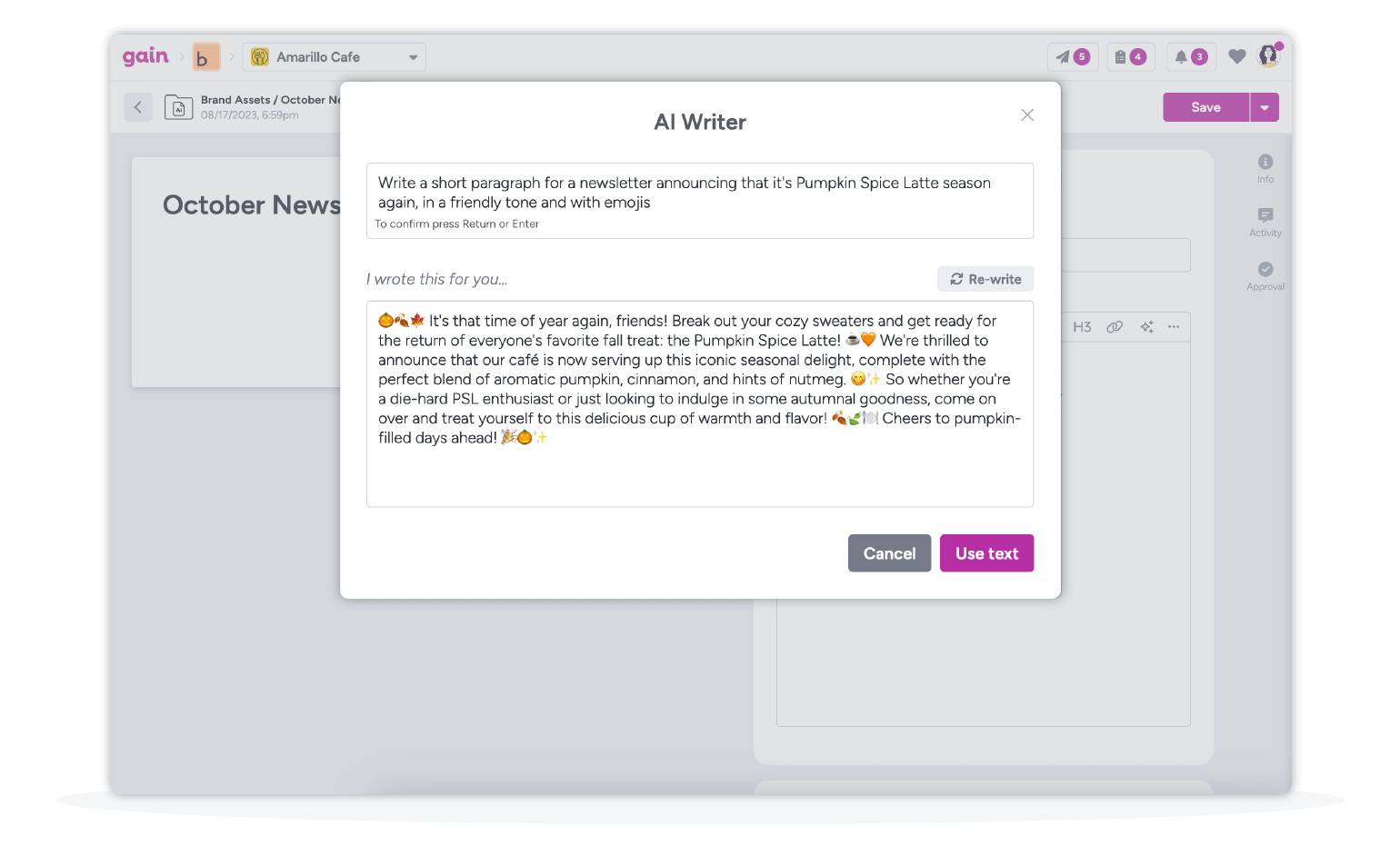
Key features include:
- Translation: Easily translate content between languages.
- Spell check: Ensure error-free writing.
- Grammar correction: Improve writing quality.
- Summarization: Condense lengthy texts for clarity.
- Idea generation: Spark inspiration for various content types.
- Reviewing AI-generated content: Thoroughly assess and refine the content generated by AI to ensure it’s accurate, coherent, and aligns with your brand guidelines.
- Getting input from experts: Share the AI-generated draft with SMEs for their input. Ask them to provide insights, make corrections, and add any necessary information.
- Finalizing your content: Carefully review the hybrid content to ensure it’s well-structured and cohesive.
Once you’re satisfied with your content, you can go ahead and publish it on your preferred platform.
Challenges of AI Content
AI-assisted content is far from perfect. David Mahbub shares on Forbes:
“AI will enable and impact content creation, making it very dynamic for brands and organizations, allowing us to pump in content. But when we talk about high-level knowledge and authoritative content, there is still much to learn from a human brain and experience.”
However, there’s a bigger issue here. AI-generated content suffers from ethical issues. Brands that do use AI in marketing should be aware of:
- Algorithmic bias: AI algorithms can unwittingly perpetuate training data biases;
- Transparency: Consumers have a right to know how AI impacts their brand interactions.
- Consent and control: Customers should have the choice to opt out of AI-powered marketing efforts if they want to. They should also be able to access and adjust the data AI algorithms use.
- Accountability: Businesses should be responsible for AI actions, conducting regular ethics audits and establishing clear accountability for any issues.
Future Trends in Hybrid Content
In the future, brands will increasingly embrace hybrid content, blending AI-generated drafts with human insights to overcome AI’s limitations.
AI content is 96% of the time incomplete, making hybrid content more appealing to marketers. This approach combines AI efficiency with human creativity, striking a balance for the content-hungry digital world, offering new possibilities, and helping overcome productivity killers.
Conclusion
AI tools have the potential to assist in the entire content creation process; however, it’s essential to emphasize that they function as aids, and not replace humans.
You still need subject matter experts, as their expertise and insights play a vital role in ensuring the quality and accuracy of the content.
Once you’ve got your hybrid content polished off, it’s time to get it published. But before you do that, you need to get your content approved. With Gain, you can set up automated approval workflows so that once somebody submits their work for approval, the next person in line is automatically notified that their input is required.
With Gain, you can also simplify client reminders by sending them automatically when content is pending review. This streamlines your team’s workflow, allowing them to focus on strategic discussions and more critical tasks, rather than sending reminders manually.
Want to see this in action? Grab Gain’s free trial now.

